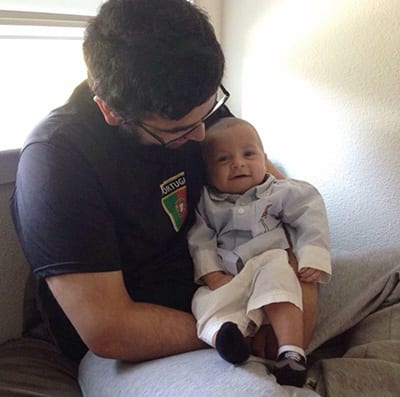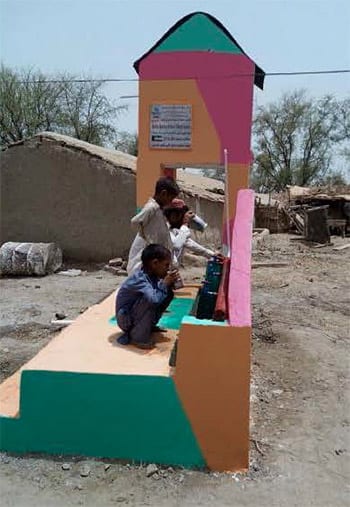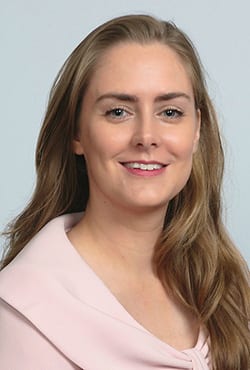By Andrew Cohen

During this holiday season and throughout the year, Berkeley Law’s altruistic spirit shines brightly. From student pro bono projects to faculty mentorship to alumni support of financial aid, giving back is a fundamental part of the school’s public mission. Here is just one story.
No one could blame Mustafa Farooq ’16 if he wanted to erase the memory of his time at Berkeley Law. While earning an LL.M. degree there, Farooq suffered an unimaginable tragedy—the death of his only child, nine-month-old Hasan, from a rare genetic disorder.
Nearly 1,500 miles from his home in Edmonton, Farooq had only been in Berkeley for half a year. He credits his LL.M. classmates and the law school community for helping to sustain him after losing his son. “I could have never imagined the support I received,” he says. “It’s hard to quantify.”
Classmates from all over the world rallied on his behalf. LL.M. Class President Karin Gaudet-Asmus ’16 organized students to cook and bring food to his family’s home.

“The idea was for volunteers to either cook or donate money for buying the needed groceries,” she says. “As it turned out, those who did the cooking didn’t want help buying groceries and paid for the food themselves.”
Many students also attended Hasan’s funeral at a Muslim community center in Fremont. “I can never fully describe what it meant to me to have my friends there on that day,” Farooq says. “I think it would have been soul-crushing not to.”
Meanwhile, with $600 of leftover donated food money, his LL.M. classmates decided to make a meaningful gift that would last a lifetime.
Recently, Farooq received photos of that gift—the most moving testament of his classmates’ support: a brightly colored well in Rojhan, Pakistan, near his family’s roots, that bears Hasan’s name and serves about 200 people in an impoverished area. Fawaz Alawadhi ’16, Farooq’s classmate, coordinated the project.
Farooq’s neighbor in UC Village as well as his classmate, Alawadhi searched for a “continuous and stable” project that would aid poor people. Described by Gaudet-Asmus as a “compassionate person, loyal friend, and skilled organizer,” he explored options with the Middle East’s Alnouri Charitable Society—and the well idea eventually gained traction.
“We considered it as an ongoing charity endowment that will last a long time and not only reward the donators during their lives, but continue to reward them after their death,” Alawadhi says.

Unwavering support
When looking at photos of the well and seeing Hasan’s name, Farooq remembers the compassion of his LL.M. classmates and recalls a famous Islamic narration.
“It states when a human being passes away, all of his or her deeds are terminated except for three types: a charitable act that continues to benefit people, a knowledge from which others benefit, or a righteous child who makes du’a for him or her,” Farooq says. “This well, in my mind at least, symbolizes a means through which Hasan’s good deeds continue on, and by which his mother and I continue to benefit from their blessings. I will never forget this.”
After earning their degrees, Farooq returned to Edmonton, Gaudet-Asmus went to El Paso, and Alawadhi returned to his native Kuwait.
All three rave about Berkeley Law’s LL.M. program, both from a curricular and cultural standpoint. Alawadhi calls his year at the school “an incredible experience. I came across many nationalities and cultures, and I broadened my appreciation for diversity and the respect for others.” Gaudet-Asmus touts “the high quality of the classes and the great help we got from the LL.M. staff,” and Farooq praises the guidance he received from professors such as David Lieberman, Sarah Song, and Christopher Kutz.
Farooq, who worked with Kutz on his thesis regarding criminal sentencing principles in Islamic law, says his instructors were all “unimaginably kind and supportive.”

Classmates say that type of gratitude typifies Farooq. Recalling Hasan’s funeral service, Gaudet-Asmus notes that, “Instead of focusing on his own grief, Mustafa made time to come outside of the cemetery, where we were gathered, to say thank you to us for being there. Tears still come to my eyes when I think about that moment.”
Gaudet-Asmus faced her own challenges while in Berkeley, including medical issues, as she learned it would not be easy for her to bear children of her own.
“But all of my personal worries were put into perspective when Hasan passed away,” she says. “It made me realize how lucky I am, and how lucky we all are, to be alive. We can’t take any part of our lives for granted. As I wrote in my email message to the LL.M students back then, life is short, so let us cherish the people we love. I cherish the memory of my classmates who came together to support Mustafa and leave behind a dignified memory for his son—a well that gives life.”